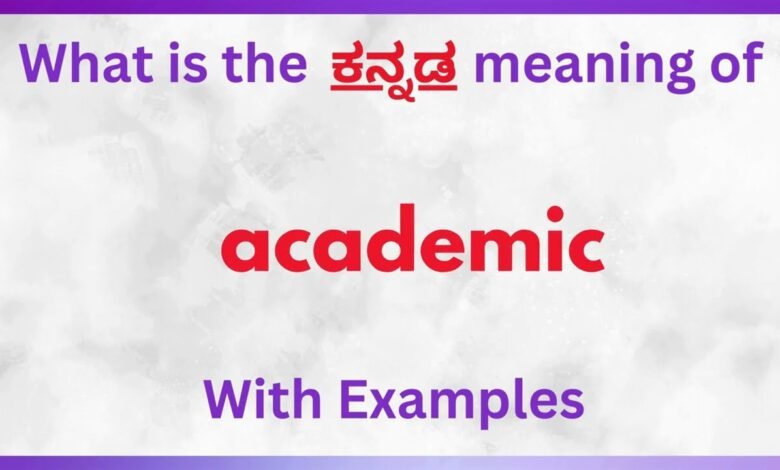Academic Meaning in Kannada: A Closer Look

As you delve into the rich tapestry of Indian languages, you may find yourself intrigued by Kannada, the official language of Karnataka. While exploring its nuances, you might wonder well-nigh the wonk meaning of Kannada and its significance in scholarly circles. This warmed-over Dravidian language boasts a literary history spanning over a millennium, with its wonk importance extending far vastitude regional boundaries. In this article, you will discover the depth and unrestrictedness of Kannada’s wonk relevance, from its classical literature to its modern applications in research and education. Prepare to uncover the linguistic treasures that make Kannada a subject of wonk fascination and scholarly pursuit.
What Is the Academic Meaning in Kannada?
The work’s meaning in Kannada is closely tied to the concept of scholarly pursuits and educational institutions. In Kannada, the term “academic” is often translated as “ಶೈಕ್ಷಣಿಕ” (shaikshanika), which encompasses a wholesale range of educational and intellectual activities.
Educational Context
In the Kannada-speaking regions of India, the wonk meaning in Kannada extends to various aspects of formal education. It includes:
- School and university studies
- Research and scholarly writing
- Intellectual spiel and debates
Cultural Significance
The concept of academics in Kannada culture goes vastitude mere classroom learning. It embodies a respect for knowledge and intellectual growth that is tightly ingrained in society. This reverence for wonk pursuits is reflected in the language’s rich vocabulary related to education and scholarship.
Understanding the wonk meaning in Kannada provides valuable insights into the educational values and aspirations of Kannada-speaking communities. It highlights the importance placed on learning and intellectual minutiae within this cultural context.
Examples of How “Academic” Is Used in Kannada
The term “academic” in Kannada, often translated as “ಶೈಕ್ಷಣಿಕ” (shaikṣaṇika), finds various applications in educational contexts. Understanding these uses can provide insight into the work’s meaning in Kannada and its significance in the local education system.
Educational Institutions
In Kannada, “ಶೈಕ್ಷಣಿಕ ಸಂಸ್ಥೆ” (shaikṣaṇika samsthe) refers to wonk institutions. This term encompasses schools, colleges, and universities, highlighting the wholesale telescopic of wonk pursuits in the Kannada-speaking regions.
Scholarly Work
“ಶೈಕ್ಷಣಿಕ ಸಂಶೋಧನೆ” (shaikṣaṇika saṃśōdhane) denotes wonk research in Kannada. This phrase is widely used in universities and research centers to describe scholarly investigations and studies conducted by academics.
Academic Year
The concept of an wonk year is expressed as “ಶೈಕ್ಷಣಿಕ ವರ್ಷ” (shaikṣaṇika varṣa) in Kannada. This term is crucial in educational planning and administration, marking the yearly trundling of studies and examinations in schools and colleges.
The Origins and Incubation of the Kannada Word for “Academic”
The concept of “academic” in Kannada, like many other languages, has roots tightly embedded in the region’s educational history. The wonk meaning in Kannada reflects the language’s rich cultural heritage and its version to modern educational systems.
Ancient Roots
In warmed-over Karnataka, centers of learning were often associated with religious institutions. The term “ವಿದ್ಯಾ” (vidyā), meaning knowledge or learning, worked the understructure for many academic-related words. This concept evolved as education systems ripened over centuries.
Modern Adaptation
As formal education systems were introduced, new terms emerged to describe wonk concepts. The word “ಶೈಕ್ಷಣಿಕ” (shaikṣaṇika) came into use, directly translating to “academic” in English. This term encapsulates the broader meaning of wonk pursuits in trendy Kannada usage.
Contemporary Usage
Today, the wonk meaning in Kannada encompasses a wide range of educational activities. From primary schools to universities, the term “ಶೈಕ್ಷಣಿಕ” is used to describe scholarly endeavors, research, and formal learning environments. This incubation reflects the language’s worthiness to transmute to waffly educational paradigms while maintaining its cultural essence.
Conclusion
In conclusion, exploring the wonk meaning of terms in Kannada offers valuable insights into the language’s rich scholarly tradition. By examining key wonk concepts through a Kannada lens, you proceed a deeper appreciation for the nuances of meaning wideness cultures, and disciplines. This linguistic journey not only enhances your understanding of Kannada but also broadens your perspective on wonk spiel. As you delve into the intricacies of wonk terminology in Kannada, remember that language is a dynamic entity, constantly evolving and adapting. Embrace this opportunity to expand your knowledge and contribute to the dialogue between variegated wonk traditions and linguistic frameworks.



